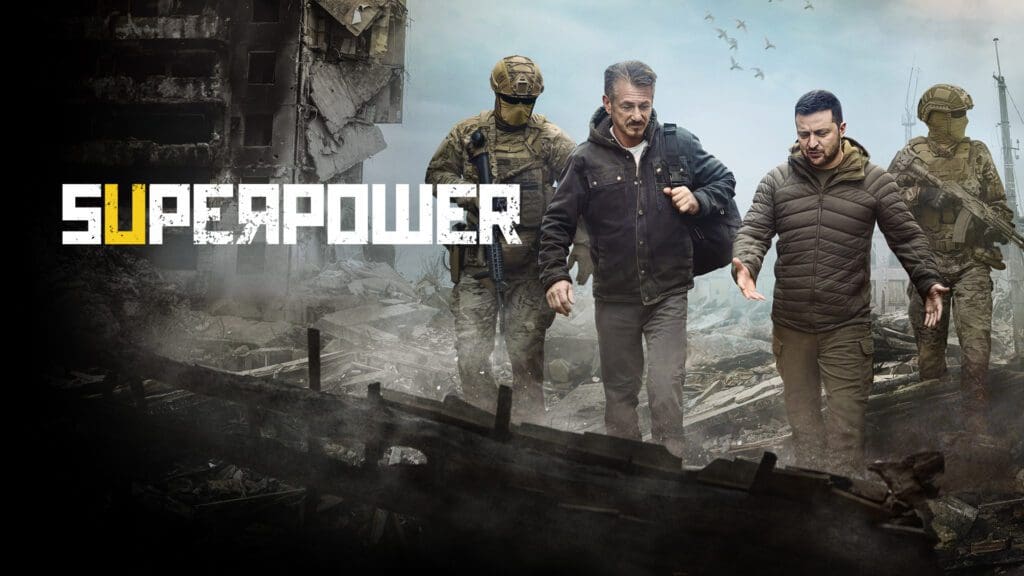Summary
Sean Penn’s summary of recent Ukrainian political history lacks focus and dwells too much on its narrator, but it also provides a decently organized snapshot of the conflict and paints a compelling portrait of Volodymyr Zelensky as a modern leader.
There’s something – and this is putting it mildly – a little odd about Superpower, the documentary about Russia’s invasion of Ukraine co-directed and narrated by Hollywood actor Sean Penn and streaming on Showtime and Paramount+.
That invasion, by the way, is one of the more significant events in recent human history, both geopolitically and fundamentally. This is the idea that Penn, who occasionally can’t decide what kind of movie he wants to make here, is determined to express, and at the very least, it’s worthwhile.
This, he says in various ways and on various occasions throughout the two-hour runtime, matters. No matter where you are in the world, the consequences of a nuclear superpower invading its sovereign neighbor will be deeply felt. And the swirling crosscurrents of politics and celebrity will ensure that the debris reaches you, one way or another.
Is this about Sean Penn or Ukraine?
In some ways, then, Sean Penn is uniquely positioned to tell this story since he is both a celebrity and a political activist, someone with the resources to gain close access to foreign world leaders – or drug lords – and the willingness to stand by them when he’s asked by the mainstream Western media to explain himself. No stranger to controversy, often related to violence, he seems uncomfortably at home on the front lines of a distant battlefield.
But his telling of this story is undermined by two things. One is that it’s not his story to tell and thus must necessarily be filtered through the navel-gazing lens of his own celebrity and reputation. The other is that he can’t settle on what material accumulated over his seven trips to Ukraine, and accounting for about a decade and a half of the country’s recent history will make the point best. So, he just uses almost all of it as and when.
Some of the more compelling stuff centers, understandably, on Ukrainian President Volodymyr Zelensky, a former political satirist and TV star in both Ukraine and Russia who was elected by, in the tradition of Ronald Reagan and, latterly, Donald Trump, blurring the lines between politics and entertainment.
For this man, essentially an actor playing the role of President, to suddenly become a wartime leader, it is essential to understand the conflict in Ukraine and the appeal of Superpower. Zelensky cuts a compelling figure because his core values overrode his carefully cultivated persona. When circumstances conspired to insist he actually become the idealized version of himself he had invented and campaigned on, he rose to the challenge and then some.
It’s frustrating, then, to keep being pulled away from him so that Sean Penn can explain in narration why he keeps going to warzones or countries in the aftermath of natural disasters or going on Fox News after being declared an enemy of the state and bicker with Sean Hannity about Zelensky’s character.
I have no doubt Penn’s heart is fundamentally in the right place, that he does what he does and says what he says because he believes himself to be correct, but I’m not especially interested in how his fame and money define his travelogues. Much of Superpower exists only because he had an interview scheduled with Zelensky on the day before the invasion, and Zelensky kept the appointment despite everything. That’s less a matter of Penn’s power and more one of Zelensky’s forward-thinking understanding of modern media.

Superpower (2023) (Credit – Paramount+)
In focusing on Penn above and beyond everything else, even though his own self-deprecating remarks reliably imply that he should be considered unimportant relative to the story he’s helping to tell, Superpower is thoroughly undermined.
In almost every sit-down interview Penn has with Ukrainian locals, soldiers, and politicians, the camera keeps settling back on Penn’s pensive face, as though his serious reaction to what he’s being told is more vital to the audience than the first-hand accounts of experts, soldiers, and citizens. It’s galling.
Superpower increases the awareness of what’s happening in Ukraine
And yet, fundamentally, one can’t escape the reality that Superpower will be more widely watched, and thus the Russian invasion of Ukraine will be better understood by a much larger audience because of Sean Penn’s involvement – a fact that he, too, is obviously aware of.
If this is true, which we can agree it is, then the value of the film is less in its compact summary of recent Ukrainian political history, and more in its reach. Its lack of focus, toying with many ideas without committing to any of them, becomes an advantage, more footnotes for audience members to educate themselves on.
If nothing else, Superpower adroitly answers the question of how Zelensky, whose reputation as a Russia-friendly TV personality cosplaying a serious and moral leader led several citizens to wonder what kind of President he might be in a time of genuine crisis, rose to the occasion when his country needed him the most.
What did you think of Superpower (2023)? Comment below.



